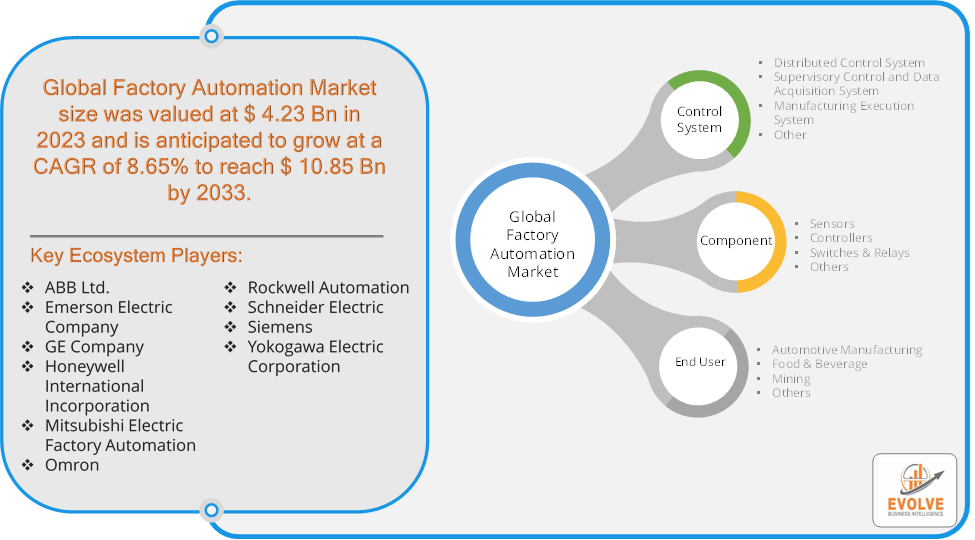Evolve Business Intelligence has published a research report on the Global Factory Automation Market, 2023–2033. The global Factory Automation Market is projected to exhibit a CAGR of around 8.65% during the forecast period of 2023 to 2033.
Evolve Business Intelligence has recognized the following companies as the key players in the global Factory Automation Market: ABB Ltd., Emerson Electric Company, GE Company, Honeywell International Incorporation, Mitsubishi Electric Factory Automation, Omron, Rockwell Automation, Schneider Electric, Siemens and Yokogawa Electric Corporation.
 More Information: https://evolvebi.com/report/factory-automation-market-analysis/
More Information: https://evolvebi.com/report/factory-automation-market-analysis/
Market Highlights
The Global Factory Automation Market is projected to be valued at USD 10.85 Billion by 2033, recording a CAGR of around 8.65% during the forecast period. The Factory Automation Market refers to the market encompassing technologies, systems, and solutions used to automate manufacturing processes in factories. This includes a wide range of products such as sensors, controllers, software, and robotic systems designed to enhance production efficiency, reduce human intervention, and improve the overall manufacturing process.
The market is driven by the need for improved productivity, reduced operational costs, enhanced safety, and better quality control in manufacturing. Industries such as automotive, electronics, food and beverages, and pharmaceuticals are key contributors to the demand for factory automation. The market is also influenced by advancements in technologies like artificial intelligence, the Industrial Internet of Things (IIoT), and robotics.
The COVID-19 pandemic had a significant impact on the Factory Automation Market. The pandemic caused disruptions in global supply chains, leading to delays in the delivery of essential components and equipment used in factory automation. Many factories experienced temporary shutdowns or operated at reduced capacity, which slowed down the adoption and implementation of automation systems. Social distancing measures and workforce shortages due to lockdowns and quarantines created operational challenges, pushing companies to consider greater levels of automation to reduce dependency on human labor. The pandemic highlighted the vulnerabilities of relying heavily on human labor, accelerating the shift towards automation. Companies began to invest more in automated systems to ensure business continuity in future crises. The pandemic underscored the importance of upskilling the workforce to work alongside automated systems. Training programs and investments in human-machine collaboration tools became more prominent.
Segmental Analysis
The global Factory Automation Market has been segmented based on Control System, Component and End User.
Based on Control System, the Factory Automation Market is segmented into Distributed Control System, Supervisory Control and Data Acquisition System, Manufacturing Execution System and Other. The Supervisory Control and Data Acquisition System segment is anticipated to dominate the market.
Based on Component, the global Factory Automation Market has been divided into Sensors, Controllers, Switches & Relays and Others. The Controllers segment is anticipated to dominate the market.
Based on End Users, the global Factory Automation Market has been divided into Automotive Manufacturing, Food & Beverage, Mining and Others. The Automotive Manufacturing segment is anticipated to dominate the market.
More Information: https://evolvebi.com/report/factory-automation-market-analysis/
Regional Analysis
The Factory Automation Market is divided into five regions: North America, Europe, Asia-Pacific, South America, and the Middle East, & Africa. North America, particularly the United States and Canada, is a leading market for factory automation due to its advanced manufacturing sector, high adoption of technology, and strong focus on Industry 4.0. The presence of major industrial companies, technological innovation, high labor costs, and a focus on improving operational efficiency drive market growth. Europe is a major player in factory automation, with Germany, the UK, France, and Italy being key contributors. The region benefits from a strong industrial base and a focus on advanced manufacturing technologies. Increased adoption of robotics and automation in automotive, aerospace, and consumer goods industries. There is also a growing emphasis on sustainability and reducing carbon footprints. Asia-Pacific is the fastest-growing market for factory automation, driven by rapid industrialization, technological advancements, and increasing investments in manufacturing infrastructure. Key countries include China, Japan, South Korea, and India. Significant investments in robotics, IIoT, and smart manufacturing technologies. There is also a focus on improving productivity and quality in diverse industries, from electronics to automotive. Latin America is experiencing gradual growth in the factory automation sector, with countries like Brazil and Mexico leading the way. The region is focusing on modernizing its manufacturing base. Adoption of automation solutions in the automotive and consumer goods sectors. There is also growing interest in leveraging technology to improve production processes and reduce costs. The Middle East and Africa region is seeing a slow but steady increase in factory automation adoption, with key markets including South Africa, Saudi Arabia, and the UAE. Investment in automation technologies in oil and gas, mining, and construction sectors. There is also a focus on improving operational efficiency and leveraging advanced technologies for industrial growth.